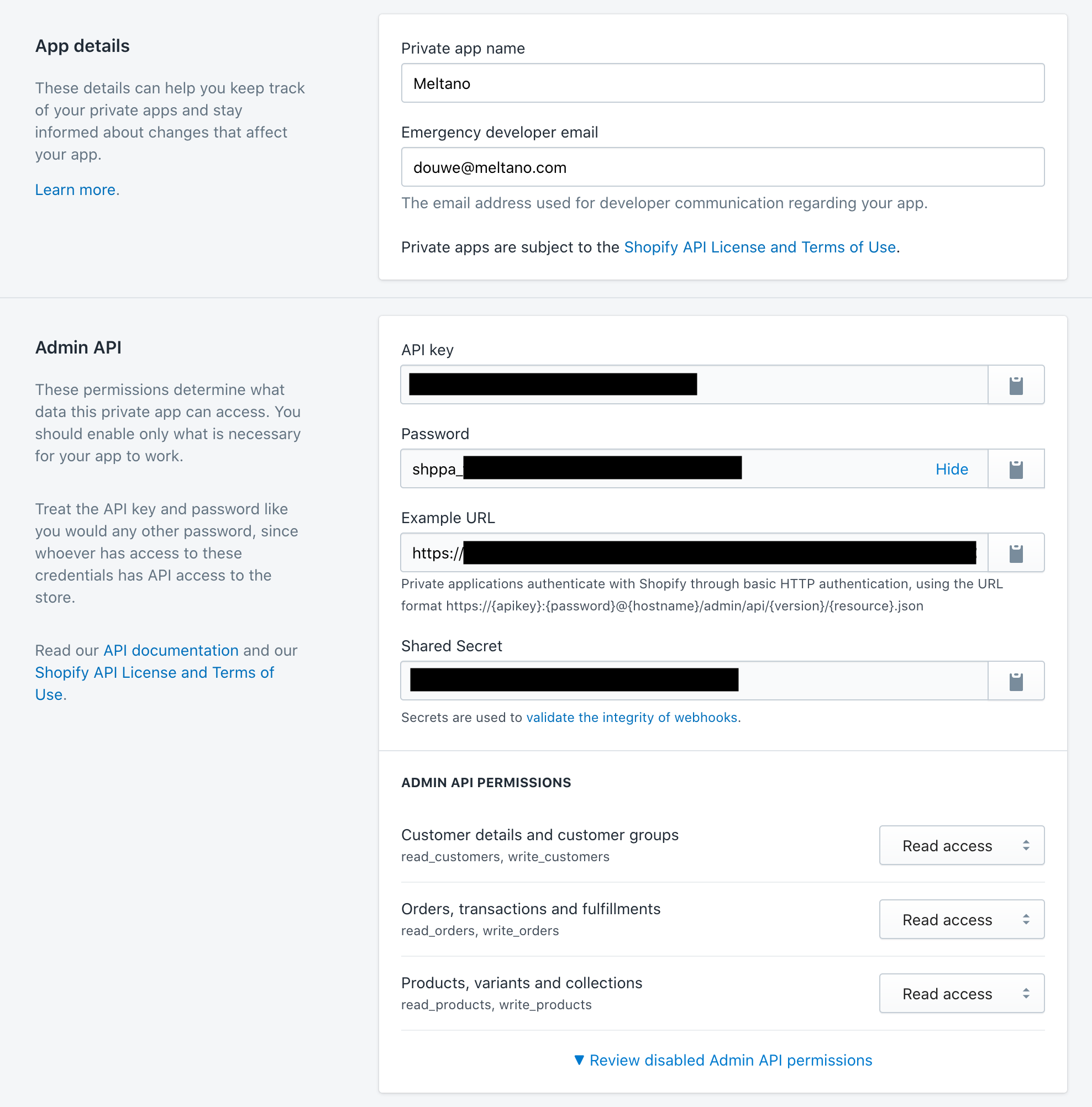The tap-shopify extractor pulls data from Shopify that can then be sent to a destination using a loader.
Alternate Implementations
Getting Started
Prerequisites
If you haven't already, follow the initial steps of the Getting Started guide:
Installation and configuration
-
Add the tap-shopify extractor to your
project using
:meltano add -
Configure the tap-shopify
settings using
:meltano config -
Test that extractor settings are valid using
:meltano config
meltano add tap-shopify --variant singer-iomeltano config tap-shopify set --interactivemeltano config tap-shopify testNext steps
Follow the remaining steps of the Getting Started guide:
If you run into any issues, learn how to get help.
Capabilities
The current capabilities for
tap-shopify
may have been automatically set when originally added to the Hub. Please review the
capabilities when using this extractor. If you find they are out of date, please
consider updating them by making a pull request to the YAML file that defines the
capabilities for this extractor.
This plugin has the following capabilities:
- catalog
- discover
- state
You can
override these capabilities or specify additional ones
in your meltano.yml by adding the capabilities key.
Settings
The
tap-shopify settings that are known to Meltano are documented below. To quickly
find the setting you're looking for, click on any setting name from the list:
You can also list these settings using
with the meltano configlist
subcommand:
meltano config tap-shopify list
You can
override these settings or specify additional ones
in your meltano.yml by adding the settings key.
Please consider adding any settings you have defined locally to this definition on MeltanoHub by making a pull request to the YAML file that defines the settings for this plugin.
Private App API Password (api_key)
-
Environment variable:
TAP_SHOPIFY_API_KEY
A Private App API Password or API Key generated using OAuth
How to get
Create private app
First, you will need to create a Private App:
- Log in to your Shopify store admin at
https://<store subdomain>.myshopify.com/admin - Click "Apps" in the sidebar on the left
- On the bottom of the page, click "Manage private apps" next to "Working with a developer on your shop?"
- Click the "Create a new private app" button
- Enter a "Private app name" of your choosing, e.g. "Meltano"
- Enter your email address under "Emergency developer email"
- In the "Admin API" section, click "▼ Review disabled Admin API permissions"
- Choose "Read access" rather than "No access" in the access level dropdowns for the following permissions:
- Products, variants and collections -
read_products, write_products - Orders, transactions and fulfillments -
read_orders, write_orders - Customer details and customer groups -
read_customers, write_customers - Click "Save"
- In the modal that appears, click "I understand, create the app"
Find your API password
Now that your app has been created, we can acquire the password Meltano will use to authenticate with the Shopify API.
- In the "Admin API" section on the private app details page, find the "Password" field and click "Show"
- The value that appears (starting with
shppa_) is your API password. You can copy and paste it into the Meltano data source configuration.

Configure this setting directly using the following Meltano command:
meltano config tap-shopify set api_key [value]Store Subdomain (shop)
-
Environment variable:
TAP_SHOPIFY_SHOP
The store subdomain, which can be derived from your Shopify admin URL.
If your admin URL starts with https://my-first-store.myshopify.com/, your store subdomain is my-first-store.
Configure this setting directly using the following Meltano command:
meltano config tap-shopify set shop [value]Start Date (start_date)
-
Environment variable:
TAP_SHOPIFY_START_DATE
Determines how much historical data will be extracted. Please be aware that the larger the time period and amount of data, the longer the initial extraction can be expected to take.
Configure this setting directly using the following Meltano command:
meltano config tap-shopify set start_date [value]Something missing?
This page is generated from a YAML file that you can contribute changes to.
Edit it on GitHub!Looking for help?
#plugins-general




-brightgreen)










-2,569-c0c0c4)
-13-c0c0c4)




